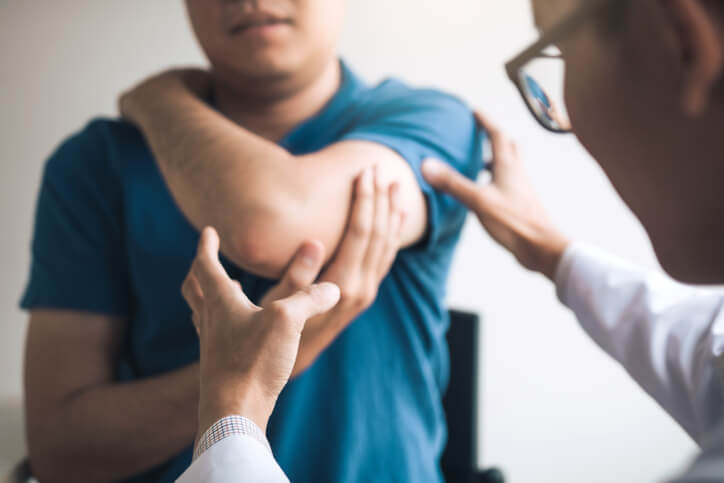Muscle strain is a common injury. Though noticeable during sports activities when a muscle strain injury can interrupt a game, muscle strain frequently occurs at work — whether you work in construction or at a computer — as well as while you’re doing household chores or enjoying a dance or a swim. At Long Island Spine Rehabilitation Medicine, our skilled physiatrists see patients with muscle strain on a daily basis. We are glad to be able to diagnose them efficiently and offer them a variety of effective, nonsurgical treatment options.
What is muscle strain?
Muscles are bands or bundles of fibrous tissue with the ability to contract and produce movement or maintain position. When a muscle fiber is overstretched or torn, it is referred to as “strained.” Tendons, though they don’t cause movement by themselves, are important muscle tissue because they attach muscles to bone, making mobility possible. Inflammation of a tendon is known as tendonitis.
Why does muscle strain happen?
Typically, muscle strain occurs due to overuse or improper use of a muscle. While any muscle can be strained, muscle strain usually occurs in the lower back, neck, shoulder, knee, and hamstring ( behind the thigh). Muscle strain typically occurs during one of the following explosive actions:
- Pushing off for a sprint
- Suddenly pivoting or changing directions during racquetball or basketball
- During a sudden increase in activity levels (as when an exercise regimen intensifies during training).
During all of the above movements, the muscle is contracting while it elongates, putting extra strain on the tissues. It should be noted that muscles that cross at two joints are most vulnerable to injury, including:
- Hamstrings (hip and knee joints)
- Calf muscles (hip and ankle joints)
- Quadriceps (hip and knee joints)
Although the hip adductor muscles cross only at the hip joint, they are also commonly affected.
Some people wonder why more athletes sustain muscle strain injuries during training rather than in games. It’s because when they begin the training regimen they haven’t yet built up their muscle strength and flexibility.
What are the signs and symptoms of muscle strain?
It is not likely that you will strain a muscle without noticing. While you may experience muscle aches days after excessive use, it is likely that a strained muscle will be felt immediately. The following are signs of muscle “pulls” or strains:
- Stabbing pain that worsens if you contract the muscle
- Inflammation, swelling, and bruising
- Loss of strength in the affected muscle
- Restricted range of motion
How Muscle Strain Is Assessed for Severity
The severity of a strained muscle is assessed by how much strength and range of motion is lost, which is also an indicator of how long recovery from the injury will take. Muscle strains are categorized as follows:
- Grade 1: Mild damage to individual muscle fibers (less than 5 percent), resulting in a minor loss of strength and motion, but mild damage may still keep a player off the field for 2 to 3 weeks while the muscle fibers heal.
- Grade 2: More extensive damage to muscle, involving a much higher percentage of fibers. Though the muscle is not completely ruptured, there is a significant loss of strength and motion. Grade 2 injuries may require 2 to 3 months to heal completely.
- Grade 3: Complete rupture of a muscle or tendon which may require surgery to reattach muscle fibers and then rehabilitative treatment as well.
Our doctors are able to diagnose all muscle strains and treat most nonsurgically with several traditional and complementary therapies. If you do require surgery, we will refer you to an excellent surgeon and assist you with customized post-surgical treatments that will accelerate the healing process.
Contact Our Experienced Physiatrists Now for Diagnosis & Treatment of Muscle Strain
Whether you have serious pain or ongoing aches that are interfering with your daily routine, make an appointment with one of our capable, compassionate doctors. We pride ourselves on being responsive to our patients’ individual needs. Contact us now so we can be responsive to yours.
